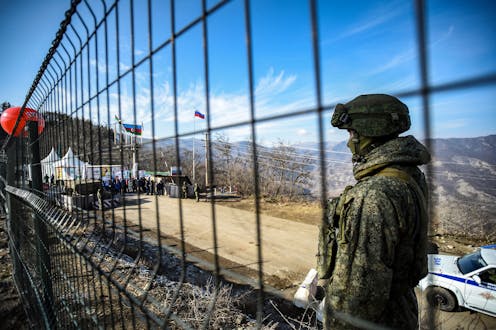
While the world is watching the destruction in Ukraine, in another corner of the former Soviet Union hostilities smolder.
Armenia and Azerbaijan accused each other on April 11, 2023, of starting a firefight close to the contested Nagorno-Karabakh region in which seven soldiers were killed.
That skirmishes in the region turned deadly is no real surprise to me – they have done so many times before. But the latest escalation has taken on a new dimension with the war in Ukraine. In short, the response from both the West and Russia to tensions between Armenia and Azerbaijan has been complicated by their commitments elsewhere. Meanwhile, other regional powers have stepped in.
The escalation of fighting over Nagorno-Karabakh predates the Russian invasion of Ukraine but has received far less attention in the West.
A year and a half before Vladimir Putin invaded Ukraine, Ilham Aliyev, Azerbaijan’s president and a man characterized by critics as a “despot,” launched a brutal attack. On Sept. 27, 2020, Aliyev sent his troops into the tiny enclave of Nagorno-Karabakh – a region populated by Armenians, who know it as Artsakh, but which is located within the Republic of Azerbaijan.
Cut off and besieged
The fighting shattered a shaky peace between Armenia and Azerbaijan that had been in place since Moscow intervened in 1994 to broker a cease-fire.
Using drones and other weapons supplied by Turkey and Israel, oil-rich Azerbaijan swiftly defeated the Armenians in 2020. Still, 44 days of conflict saw thousands of military casualties on both sides and scores of civilian deaths.
It concluded, again, with a Russia-backed cease-fire.
But the war never really ended.
In the period since, Azerbaijan has continued to send its forces into the Republic of Armenia amid counterclaims of border transgressions. Meanwhile, government-backed, self-styled “eco-activists” have blockaded the Lachin corridor, the single road that linked Armenia with Nagorno-Karabakh. From Dec. 12, 2022, until now, the roughly 120,000 Karabakh Armenians have been cut off from potentially lifesaving food and medicine as a result of the blockade.
The U.S. government – among others – has protested the blockade, with Secretary of State Antony Blinken phoning Aliyev to “urge an immediate reopening of the Lachin corridor to commercial traffic.” But Washington appears either powerless or unwilling to exert real pressure, ruling out – for now at least – the use of sanctions against Azerbaijan. And with the Ukraine war pushing up energy prices, Western states have an incentive not to be too harsh on oil- and gas-rich Azerbaijan.
Meanwhile, Russia, mired in the mud of Ukraine, has not been able to fulfill its role as guarantor of the 2020 armistice. Putin also appears disinclined to aid Armenia, its one loyal ally in the South Caucasus, mindful of the need for dedicated military resources elsewhere.
Finding, losing regional friends
The relative absence of Moscow in the current plight of Nagorno-Karabakh breaks with almost a century of geopolitical practice.
The striving of Karabakh Armenians to secure autonomy from the rule of Azerbaijan may look to some observers like an intractable struggle between Christian Armenians and Muslim Azerbaijanis. Yet Nagorno-Karabakh existed for 70 years within the Soviet Union as an autonomous oblast, or province. During that period, the Kremlin kept the peace between the two Soviet nations that laid claim to the territory.
But as ethnic nationalism grew in the late Soviet decades, and the reforms of Mikhail Gorbachev loosened the hold of Moscow over non-Russian republics, animosities between Azerbaijan and Armenia erupted.
When the Soviet empire fell in 1991, the two newly independent republics went to war over Nagorno-Karabakh.
Russia armed both, playing one republic against the other.
But of the two, Armenia has traditionally been closer to Russia. Relations between Moscow and Armenia have cooled in recent years, not least due to Putin’s suspicions of Armenia’s lurch toward democracy since 2018. But as a member of the Moscow-led strategic alliance, the Collective Security Treaty Organization, Armenia remains a Russian ally and has no other defender but Moscow. Which makes its position now all the more vulnerable if Putin withdraws his support.
By contrast, Azerbaijan has seen its regional allies Israel – spurred by a shared hostility to Iran – and Turkey step up in recent years. Both have supplied Azerbaijan with advanced weaponry, giving the country an upper hand in the conflict.
Great powers sitting this one out
The war in Ukraine is presented in the West as a confrontation between autocracy and democracy. Yet the conflict in the distant South Caucasus is not being viewed in the same light – despite how it pits one country that has taken strides toward democracy, Armenia, against an autocratic Azerbaijan.
The United States, in its muted response to the blockade, and Russia, with a cold calculation of military costs and benefits, appear content to wait to see what will become of Armenians and Azerbaijanis killing each other.
Russia’s own actions have left it hamstrung, mired in the quagmire of Ukraine. But Armenia’s friends in Washington are beginning to question where is the “indispensable nation,” as the U.S. styles itself, when a small, besieged people need it most.
Ronald Suny does not work for, consult, own shares in or receive funding from any company or organization that would benefit from this article, and has disclosed no relevant affiliations beyond their academic appointment.
This article was originally published on The Conversation. Read the original article.







